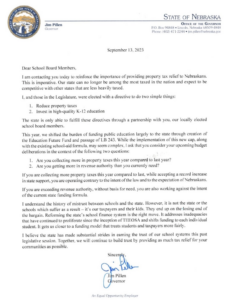
Aaron Sanderford
LINCOLN — Nebraska Gov. Jim Pillen doubled down last week on his effort to curb higher spending by local school districts after the state invested in a tax shift meant to ease property tax bills.
Pillen sent a letter Wednesday to every school board member in the state, the Governor’s Office confirmed. He repeated his push to restrain spending that echoed his Sept. 1 call with superintendents.

Several board members said privately that schools are spending more because of inflationary costs, not greed. One described what the governor is doing as “bullying.” Board members declined to be quoted by name, citing fear of retribution.
Pillen’s letter urges school board members to use all but a sliver of the Legislature’s new $300 million investment in K-12 schools as he and state senators intended — for property tax relief, not for new spending.
Two questions
He asked them to consider two questions:
“1. Are you collecting more in property taxes this year compared to last year? 2. Are you getting more in revenue authority than you currently need?”
If school districts collect more in property taxes this year over last year while accepting more money from the state, they are “operating contrary to the intent of the law,” Pillen writes.
Districts rushing to exceed the new law’s 3% a year cap on revenue authority without urgent needs are “working against the intent of the current state funding formula,” the letter says.
Higher costs
After the governor’s Sept. 1 call with superintendents, several school leaders told the Examiner they are only increasing spending for real needs. Among them: higher diesel fuel costs for buses, higher health care costs, higher staff salaries and higher energy costs.
And many districts are struggling to hire enough teachers and other staff.
Not every school district has seen a windfall from the state’s changes. During a recent board meeting, Norfolk Public Schools officials told News Channel Nebraska that the district expects to receive $433,000 less in state aid funding under the new system than the old.
They and other, larger districts, including the Omaha Public Schools, hope to see their finances made whole by the increase in state funding for special education, which lawmakers tweaked for districts that previously received more in state aid.
Frustrations on all sides
Frustrations started bubbling out last week from teachers, school board members and school administrators. Several said Pillen’s pressure campaign proved that the state’s talk of “new funding for education” was just a tax shift and not new funds for improving education.
Lincoln middle school teacher Jake Bogus tweeted Pillen’s letter, joking with his followers: “Hi folks. Jim Pillen here. We have a major crisis happening in public education. Shortage of teachers, substitutes, paras, bus drivers, and other various staff. I value public education. But please, local school boards, don’t spend $ on it. Keep those property taxes down.”
State Sen. Lou Ann Linehan of Omaha, a Pillen supporter, said this pushback is “why it’s so hard to fix property taxes.”
She said the state is trying to do what school leaders say they want by picking up more of the tab for K-12 education. School boards, she said, want state funding but also want local control of how much they spend.
“If the taxing entities want to keep their taxing authority, they need to become partners with the governor and the Legislature,” Linehan said. “They could lose their taxing authority.”
Linehan sponsored a bill this year that created a tax credit for donors who fund scholarships for needy students to attend private K-12 schools. Pillen supported the effort. Critics have argued the tax credit could eventually threaten the amount of state money available to fund public education.
Fiscal fight ahead
Jenni Benson, president of the Nebraska State Education Association, said school boards “will continue to be fiscally responsible in their budgeting while working to ensure students in their communities receive a quality education.”
She said they’ve been doing a difficult job well while the state has lagged at 49th nationally in the level of state support for K-12 education. (Nebraska’s ranking will likely improve once the new state spending is factored in.)
“It’s important to remember that local school board members are unpaid public servants who care about their communities … and they listen to their constituents and know the needs of their schools and communities,” Benson said.




